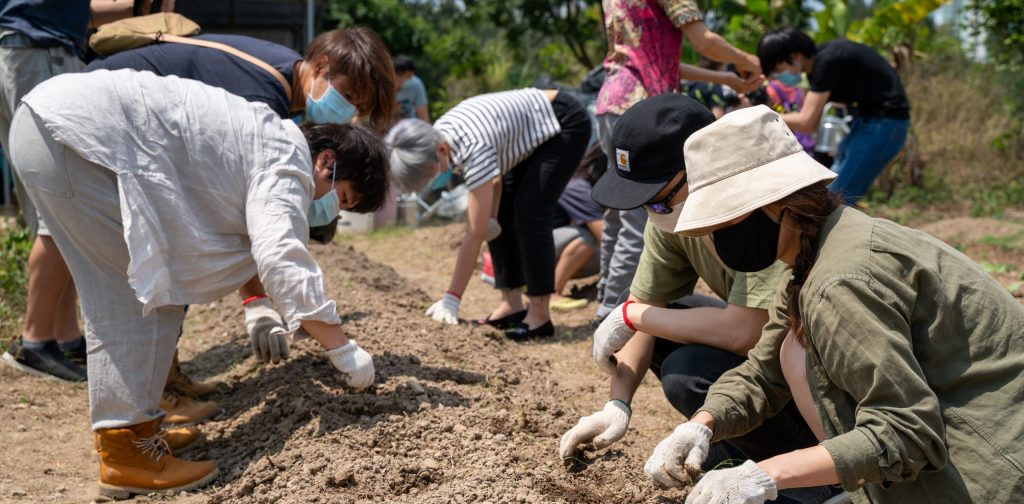
GroundWorks, St James’ Settlement: Building a Community Oriented Mutual Economy Development Model.
Established in 2007, GroundWorks adopts the community economic development model and Community Oriented Mutual Economy (時分券)with aims to improve the quality of life of local communities. Members are provided with dignity working opportunity in exchange of time vouchers for the products they need, e.g. fresh vegetables. Members’ active participation with regular member meetings facilitate their communication for co-deciding important issues and development direction.
View Video Book Punch: Rethinking the Values of Books and Local Food Production.
Opened in 2020, Book Punch provides a platform for the local community to gather and share views through reading books and seminars. Breaking the usual buying and reading practice, Book Punch enables the community to rethink the values of “books” – the book shop has no discount offered to the customers but they can get local fresh farm produce. Book Punch hopes to urge the community respecting the authors and caring about the local food production.
View Video 天姿作圍: Time-voucher to Bring New Vibes and Achieve Community Empowerment.
Initiated in 2013, it hopes to create an opportunity for women in Tin Shui Wai to bring new vibes and creations in the neighborhood. They aim to bridge the social capital, idle space and excessive resources in the area with collective power with grassroots women and nature. Applying the framework of the Eco-Village, on "ecology", "society", "economy" and "world view" levels, they attempt to practice sustainable living and strengthen social resilience. Foci of their work include: (1) setting up a "time-voucher" labour hour and product redeem system, (2) ecology farming and local food production (3) community and agriculture educational tours and workshops and (4) community organizer training.
View Video AuLaw Organic Commons: Connecting Farmers in the Tai Kong Po Tsuen Community.
AuLaw Organic Commons builds an online purchase and delivery platform on a website that features in selling high standard local, fresh and organic farm products. The project team hopes to connect farmers in the Tai Kong Po Tsuen community to join the sales platform, building a “co-selling” network. It is hoped that the income and production of farmers can both be enhanced. Also, the team would like to build a mutually beneficial interaction between rural and urban community by inviting the latter to join the project's delivery scheme and farm activities. The team believes CSA can exist in various forms. Apart from consumption, the team would also like to build a healthy relationship between urban and rural communities with mutual understanding, benefit and trust.
View Video Hong Kong Women Workers' Association (HKWWA): Women Empowerment and Capacity Building.
Founded in 1989, HKWWA is a Kwun Tong-based charity dedicated to lifting working-class women from poverty. It provides services and training to empower women to change the society with their capability. It also helps women to set up workers cooperatives to run business with economic democracy strategies, explore alternatives to address women's economic need and restore their dignity. An example is “CU Women Cooperative” (女工合作社). Workers in the kiosk are considered “members”, and are awarded the same hourly wage regardless of their experience. They hold meetings in discussing daily issues of the kiosk, from what food to serve to the usage of revenue. Profit made by the kiosk was used in supporting the establishment of other cooperatives, as well as funding local labour activities.
View Video The Federation of Vegetable Marketing Co-Operative Societies (FVMCS): Building a Vegetable Marketing Networks for Farmers in Hong Kong.
Established in 1953 by a group of farmers in Hong Kong, FVMCS is a farmer’s organisation with more than 20 member cooperative societies from different region of the territory. The aims of FVMCS include providing support to members in farming technology, farm produce development, marketing and product distribution in Hong Kong. The roles of member societies are to manage the flow of vegetable marketing including logistics and wholesale as well as to operate the vegetable collection points. It acts as a bridge between the members and the government, while coordinating these societies’ operation. All the societies are financed by the commissions received in the marketing process.
View Video 
Videos adopted from Panel: Transgressing Neo-liberal Value and Centralizing Power: Hong Kong Commons in Practice at The International Association for the Study of the Commons 2021
